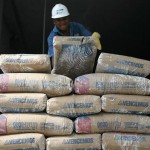There was something wrong with news report last night to the effect that President Goodluck Jonathan had decreed a 30-day period within which cement manufacturers in Nigeria have to bring down the price of the product.
A 50-kg bag of cement currently retails for N2,300.00, a 27.78% rise over the N1,800.00, which it sold for in January. What price would be acceptable to the president by month-end June? N1,800.00 per 50-kg bag, or even less? And what penalties for manufacturers if they fail to meet the “new price” by the deadline? Not much was mentioned around these scores.
Doubtless, all of these are central concerns. But there is a bigger worry.
When in 1989, the Berlin Wall came down, most people celebrated a re-birth of political choice: now the populations of a number of former Soviet satellite states could freely choose their political leaders. There was however, a much more real set of choices: the economic one. The Soviet system failed precisely because its leaders failed to understand (or even accept) the laws of economics. The aggregate of individual choices did not matter in the calculation of resource use in those countries. It was more important for factories to meet state-allocated quotas.
Yet prices are a function of how much a segment of an economy is willing to pay for an item, and how much another part of it needs to earn to produce a given quantity of that item. Given a certain level of production therefore, the more the demand for a commodity, the higher the price will be. However, in the absence of major lets to the supply of such products, over time, new suppliers should enter the market, or new substitutes found, all of which then act to depress prices.
The Soviet system failed on this test.
And President Jonathan’s government? Or better still, the Nigerian system?
Back to our specific circumstance. Rising cement prices could indicate new found wealth in the country, which in turn drives the demand for new built-up spaces (and hence for cement). Ideally, over time, (even with this most unlikely of scenarios) higher prices should have invited marginal suppliers, a process that would have helped take the sting out of the elevated prices. Now, this hasn’t happened.
Of course we know that Nigerians are not richer. If anything, they may have gotten poorer over the last electoral cycle. So what’s the problem with cement prices?
One possiblity is that there could be structural or cyclical impediments to the entry of new manufacturers into the industry, including most especially a government system of generalised bans on the importation of certain commodities accompanied almost immediately by the grant of select waivers to favoured persons.
Properly dimensioned, therefore, government’s challenge is to address the structural/cyclical lets to the entry and exit of new businesses across this economy, not just in the cement manufacturing business. That way, the price mechanism will function in a way that allows us to use our increasingly scarce resources most efficiently.
The command and control route has a great history behind it.

Thanks for this. I read the story on BusinessDay this morning and I could not believe it. Does the president not have economic advisers? Do they not go over notes with him before he makes public speeches/announcements/directives? I really do not understand why a president of Nigeria thinks he can command manufacturers to reduce the price of their products. I am surprised he stopped there and didn’t extend his directives to farmers. Maybe you and I are just missing a serious part of the argument, a part that the president decided not to make when he gave the directive.